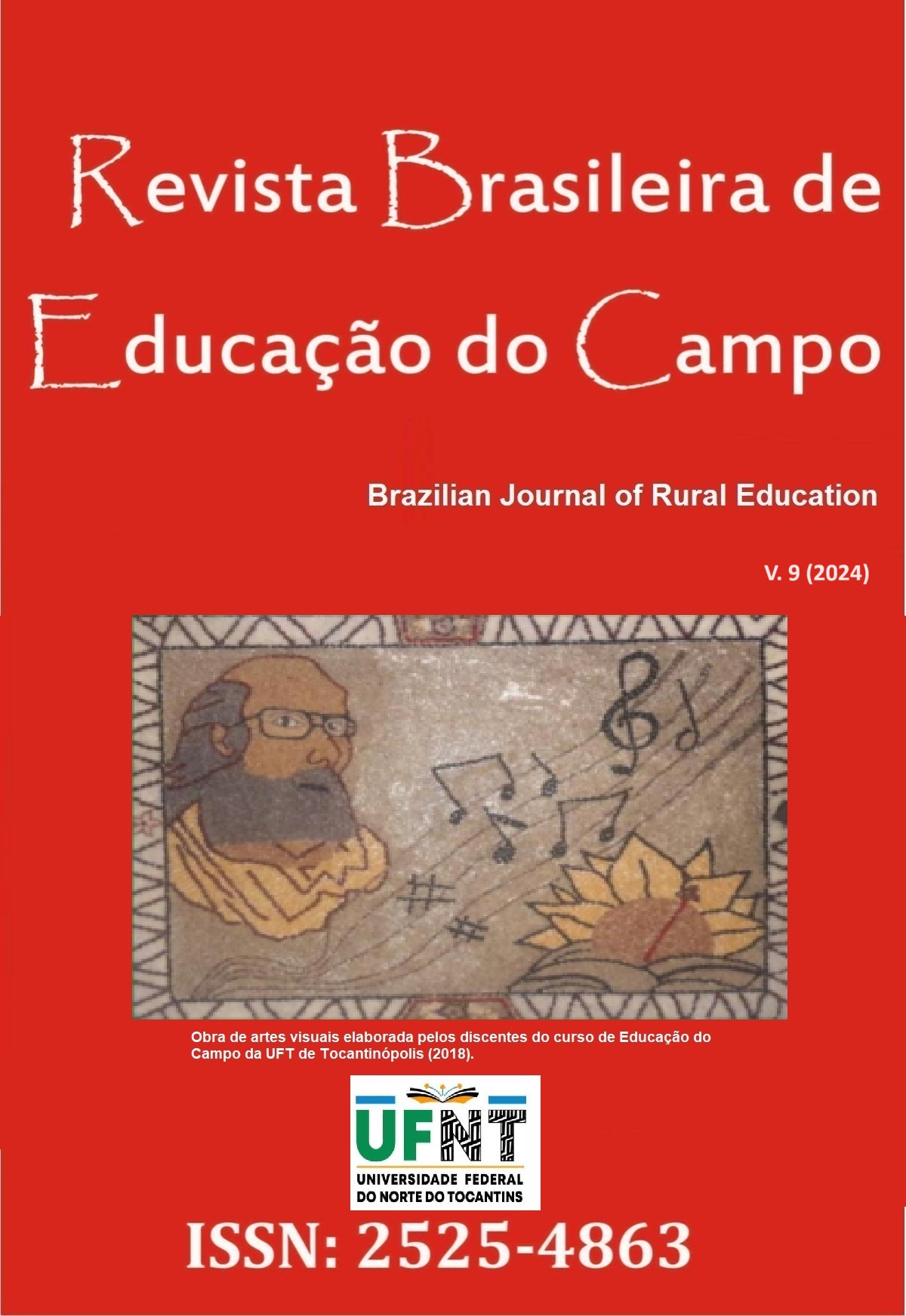Dialogues between Science Education, Rural Education, and Decoloniality: An Analysis of Brazilian Academic Production (2002 to 2022)
DOI :
https://doi.org/10.70860/ufnt.rbec.e19211Résumé
This research reviews the literature on the intersection between science education and rural education, focusing on the presence of decoloniality and traditional knowledge of the countryside in publications from the Brazilian Journal of Rural Education (RBEC) and the proceedings of the National Meeting of Research in Science Education (ENPEC) between 2002 and 2022. The objective is to investigate how these themes are represented in academic productions. A total of 98 works were analyzed, identifying 50 that address decoloniality, with 29 from ENPEC and 21 from RBEC. Although only a few works directly mention decoloniality, many use related terms such as traditional and popular knowledge. The results indicate a significant presence of decoloniality, suggesting a paradigm shift in education research, which begins to value the voices and perspectives of rural communities. The research concludes that despite the advances, there is still room to deepen the recognition and integration of traditional knowledge in science education, promoting a more inclusive and representative education of the diverse epistemologies of the countryside.
Téléchargements
Références
Aikenhead, G., & Michell, H. (2011). Bridging Cultures: Scientific and Indigenous Ways of Knowing Nature. Toronto: Pearson Canada Inc.
Arroyo, M., Caldart, R., & Molina, M. (Orgs.). (2011). Por uma educação do campo. Petrópolis, RJ: Vozes.
Caldart, R. (2004). Elementos para construção do projeto político e pedagógico da educação do campo. In Molina, M., & Jesus, S. (Orgs.). Contribuições para a construção de um projeto de educação do campo (pp. 13-46). Brasília, DF: Articulação Nacional por uma Educação do Campo.
Cardoso, L. de R., & Araujo, M. I. (2009). Entre o exigido e o produzido: o currículo escolar por professores de ciências em escolas do campo. Memorias VII ENPEC. VII Encontro Nacional de Pesquisadores em Educação em escolas do campo.
Chassot, A. (2008). Fazendo Educação em Ciências em um Curso de Pedagogia com Inclusão de Saberes Populares no Currículo. Química Nova na Escola, 27, 9-12.
Dalmagro, S. (2012). A escola no contexto das lutas do MST. Revista HISTEDBR Online, 11(41). Recuperado de https://periodicos.sbu.unicamp.br/ojs/index.php/histedbr/article/view/8639920
Damasceno, M., Amorim, G. C., & Cardoso, D. R. (2022). Modernidade/Colonialidade/Decolonialidade: perspectivas teóricas e históricas. TEL Tempo, Espaço e Linguagem, 13(1), 12-27. DOI: https://doi.org/10.5935/2177-6644.20220002
Dussel, E. (1993). Europa, modernidad y eurocentrismo. Revista de Cultura Teológica, (4), 69-81. DOI: https://doi.org/10.19176/rct.v0i4.14105
Farias, M. N., & Faleiro, W. (2018). Movimento de educação do campo enquanto fenômeno decolonial: afirmando percursos de desobediência político-epistemológica. Revista Educação e Cultura Contemporânea, 15(39), 357-374. DOI: https://doi.org/10.5935/2238-1279.20180038
Martello, C., Hoffmann, M. B., & Teixeira, M. R. F. (2021). A teoria decolonial e ensino de ciências: um recorte bibliográfico. Anais do XIII Encontro Nacional de Pesquisa em Educação em Ciências. Recuperado de https://editorarealize.com.br/artigo/visualizar/76072
Mignolo, W. (2017). Colonialidade: O lado mais escuro da modernidade. Revista Brasileira de Ciências Sociais, 32(94). Acesso em 2 de setembro de 2023 em http://www.scielo.br/scielo.php?script=sci_arttext&pid=S010269092017000200507&lng=pt DOI: https://doi.org/10.17666/329402/2017
Mignolo, W. D., & Veiga, I. B. (2021). Desobediência Epistêmica, pensamento independente e liberdade decolonial. Revista X, 16(1), 24-53. DOI: https://doi.org/10.5380/rvx.v16i1.78142
Kato, D. S., Galamba, A., & Monteiro, B. A. P. (2023). Decolonial scientific education to combat ‘science for domination’. Cultural Studies of Science Education, 18(1), 217-235. DOI: https://doi.org/10.1007/s11422-023-10165-4
Quijano, A. (2002). Colonialidade, poder, globalização e democracia. Novos Rumos, 17, 4-28.
Quijano, A. (2010). Colonialidade do poder e classificação social. In B. de S. Santos & M. P. Meneses (Orgs.), Epistemologias do Sul (2ª ed., pp. 67-87). Coimbra: Almedina.
Santos, B. S. (2006). Do pós-moderno ao pós-colonial e para além de um e do outro. In Santos, B. S. (Org.). A gramática do tempo: para uma nova cultura política (pp. 23-43). Porto: Afrontamento.
Santos, B. de S., & Meneses, M. P. (Orgs.). (2010). Epistemologias do Sul. Coimbra: Almedina.
Silva, A. B., Zang, C., Paludo, C., Camini, I., Cover, M., Luz, M. F., & Reichenbach, V. (2006). Formação de educadores e educadoras do e no campo. In Caldart, R. S., Paludo, C., & Doll, J. (Orgs.). Como se formam os sujeitos do campo? Idosos, adultos, jovens, crianças e educadores (pp. 141-157).
Sikora, D. (2013). A educação e seus condicionantes frente ao êxodo rural. Revista HISTEDBR On-Line, 13(50). DOI: https://doi.org/10.20396/rho.v13i50.8640293
Souza, J. (2020). Uma proposta de educação científica para a formação do docente do campo (Tese de Doutorado, Instituto de Física da Universidade Federal do Rio Grande do Sul). LUME – Repositório Digital (UFRGS). Recuperado de http://hdl.handle.net/10183/217486
Souza, J. (2021). A educação científica do campo. Revista Educar Mais, 5(4), 709-713. DOI: https://doi.org/10.15536/reducarmais.5.2021.2440
Walsh, C. (2005). Pensamiento crítico y matriz (de)colonial. Reflexiones latinoamericanas. Quito: Ediciones Abya-yala.
Walsh, C. (2007). Interculturalidad colonialidad y educación. Revista Educación y Pedagogía, (48), 25-35.
Walsh, C., Oliveira, L. F., & Candau, V. M. (2018). Colonialidade e pedagogia decolonial: Para pensar uma educação outra. Arquivos Analíticos de Políticas Educativas, 26(83). http://dx.doi.org/10.14507/epaa.26.3874 DOI: https://doi.org/10.14507/epaa.26.3874
Téléchargements
Publié-e
Comment citer
Numéro
Rubrique
Licence
© Thallita Nascimento da Silva, Samuel Molina Schnorr 2025

Cette œuvre est sous licence Creative Commons Attribution 4.0 International.
Proposal for Copyright Notice Creative Commons
1. Policy Proposal to Open Access Journals
Authors who publish with this journal agree to the following terms:
A. Authors retain copyright and grant the journal right of first publication with the work simultaneously licensed under the Creative Commons Attribution License that allows sharing the work with recognition of its initial publication in this journal.
B. Authors are able to take on additional contracts separately, non-exclusive distribution of the version of the paper published in this journal (ex .: publish in institutional repository or as a book), with an acknowledgment of its initial publication in this journal.
C. Authors are permitted and encouraged to post their work online (eg .: in institutional repositories or on their website) at any point before or during the editorial process, as it can lead to productive exchanges, as well as increase the impact and the citation of published work (See the Effect of Open Access).














